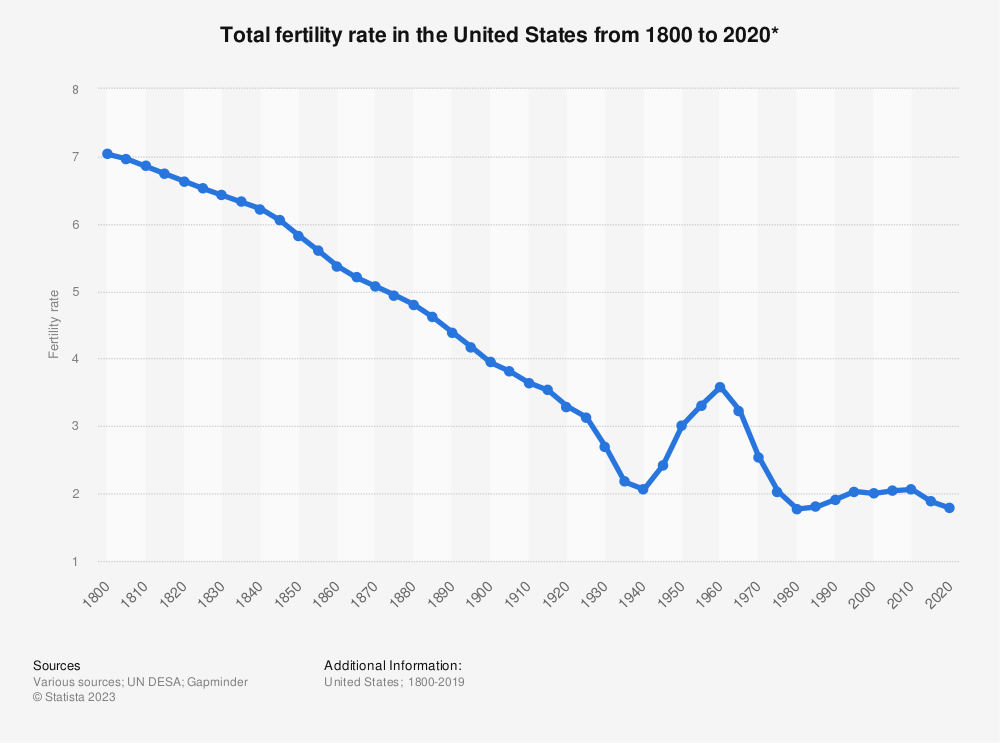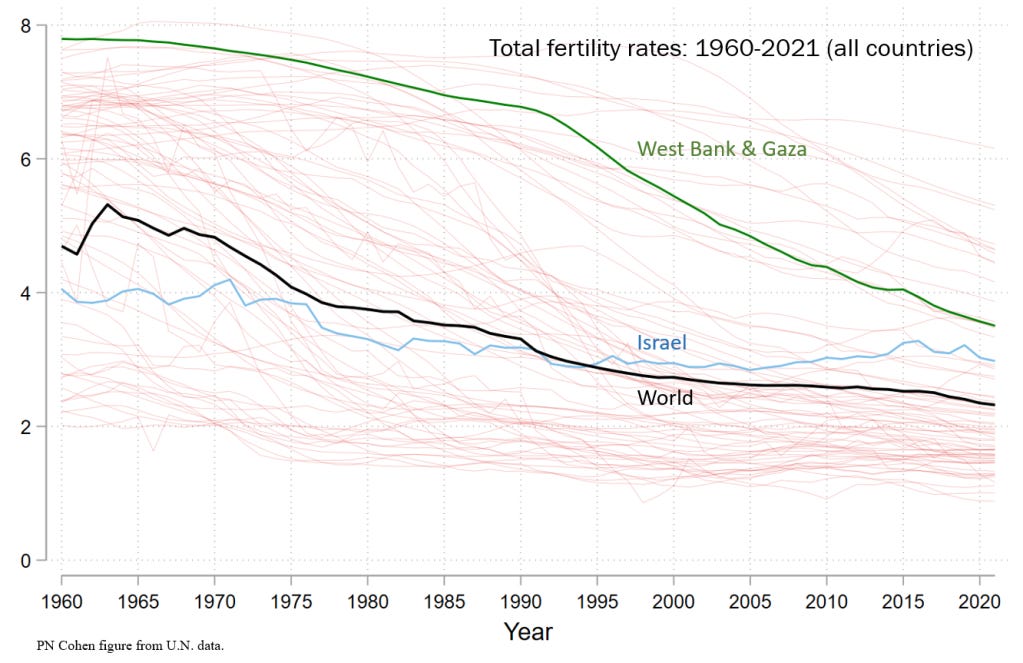Natalism as Non-Conformism
No one else is breeding? Don't let that stop you.
During the Great Depression, America’s Total Fertility Rate crashed. In 1940, TFR dipped below the standard replacement rate of 2.1 for the first time. Then, without warning, this trend reversed. The U.S. entered the famous Baby Boom. Over the next two decades, TFR almost doubled.
What happened? The usual story is that large families were an unaffordable luxury during the depths of the Depression. Once the U.S. entered the post-war boom, prospective parents had money to burn — and “therefore” fertility “naturally” exploded.
Why put “therefore” and “naturally” in scare quotes? Simple: In the modern world, prosperity has become the go-to explanation for low fertility. We’re supposedly too enthralled by the succulent consumer society that surrounds us to bother changing diapers. But if you buy that story, shouldn’t the U.S. have had its Baby Boom during the Great Depression, followed by a post-war Baby Bust?
Another popular story is that the Pill crashed U.S. fertility. This, too, raises more questions than it answers. The U.S. military made condoms standard issue in 1931. Every American soldier who returned home after World War II was intimately familiar with contraception. If a Baby Bust followed World War II, observers would sagely opine, “Of course fertility fell. G.I.s got used to condoms during the war.” Since the opposite happened, mum’s the word.
Why then did fertility rebound so vigorously after World War II? I honestly don’t know the full answer. But one major factor, I am convinced, was sheer conformity. During the Baby Boom, women had lots of kids in large part because other women were having lots of kids, too. If the average is four kids and you only have one, you look weird. People — especially women — don’t like looking weird. So they kept having them until they hit contemporary normality.
I know, conformity-centric theories of human behavior sound like a cop-out: “Conformity explains everything, and therefore nothing.” But that’s wrong. Saying: “People in France speak French because almost everyone else in France speaks French” is true and informative. The same goes for “Americans during the Baby Boom had lots of kids because almost everyone else in the U.S. during the Baby Boom was having lots of kids” is also true and informative. While neither is the whole story, conformity is a mighty and ubiquitous motivation.
Or consider family size in Israel and Palestine. Their economies differ radically: Israel is rich, Palestine is poor. Their policies differ radically: Israel funds piles of pro-natal subsidies, while Palestine’s de facto governments have lower combined cash flow than any one of Israel’s top ten corporations. Religiosity, too, differs radically: While both countries have plenty of fundamentalists, Israel has a large secular contingent that is virtually invisible in modern Palestine. Nevertheless, women in both countries have piles of kids. Once again, the conformity story fits: Israeli women conform to the big family Israeli norm; Palestinian women conform to the big family Palestinian norm. Result: Despite radically different situations, both peoples are extraordinarily fertile.
Suppose I’m right. Doesn’t this mean that reversing fertility in “empty cradle” countries is hopeless? Hardly. Changing one conformist’s financial incentives won’t change their behavior much, but changing all conformists’ financial incentives can change their behavior dramatically. Why? Because of what Glaeser and Sacerdote call “the social multiplier.” In a conformist world, every financial nudge causes an additional social nudge, which starts a chain reaction of further social nudges.
Fine, but what can one individual do in the face of our anti-natal culture? I respond with a simple slogan: What conformity has done, non-conformity can undo. So what if nobody else is having kids? If, like me, you think that the creation of new life is glorious and exciting, disregard the prevailing opinions of your society and do as you think best. While ordinary humans are highly conformist, you are free to choose to be one of the extraordinary humans.
Granted, there is no intrinsic link between non-conformism and natalism. In a natalist society, conformism boosts fertility. But in our anti-natalist society, we need non-conformist steel to breed. This is especially easy for young women, because men’s preferences for family size are quite flexible. If a guy likes everything else about you, “I want three kids” will rarely be a deal-breaker. But men, too, can greatly improve their odds of finding a natalist partner by deprioritizing looks in favor of shared values. Which you ought to be doing anyway.
When we had our fourth child, someone half-jokingly compared our family to Cletus Spuckler’s massive brood on The Simpsons: “People are looking at you like you’re a pack of idiots.” After hearing this, I started staring at strangers’ faces to read their silent judgments. Honestly, I never detected any hint of disdain.* If I had, however, I would have laughed right in their faces. I never cared much what strangers thought about me on trivial matters… like whether I should be wearing shorts. Why should I pay attention to strangers who hold the monstrous opinion that my fourth child should never have been born?!
* I did however encounter open disdain back when we only had two little babies. My wife and I were pushing our twin stroller on the mixed-use trail in Reston. Two female joggers in their early forties ran by. When they falsely believed we were out of earshot, one told the other: “Now there’s a reason to shoot yourself.”
I suppose you could call that “pity” rather than “disdain,” but I heard no sympathy in her voice.






I can't remember how much of the Baby Boom's fertility boost was associated with higher marriage rates (as opposed to higher married TFR), but IIRC it's a lot of it. I'm sure it's not a coincidence that it happened at a time when marriage rates were spiking and that its end coincided with divorce rates soaring in the 1970s.
So I think a good part of the conformity has to do with marriage itself. Which honestly aligns more with my lived experience. A lot of people just don't look much outside their own family unit to decide if they should have one more kid. They're much more focused on thinking about their own lives and what another kid means to them. But single culture is very real; if everyone you know is married by their mid-20s, then being single is that much lonelier and you're prepared to compromise more in your choice of mate (plus everyone is trying to set you up and marry you off). If a lot of people around you are single into their 30s, then being single throughout your 20s is not so bad, no hurry.
Even if you eventually get married either way, you're likely to end up with more kids the earlier you marry. A longtime friend of my mother's is a case in point: she has 3 kids, born when she was 24, 26, and 36. Maybe the last was an accident, or maybe she just felt a last twinge of baby fever with both kids becoming more independent, I don't know. But it's a good bet that if she had started at 34 instead of 24, she'd have ended up with 2 kids at most.
Judgy joggers in Reston, VA. That tracks.